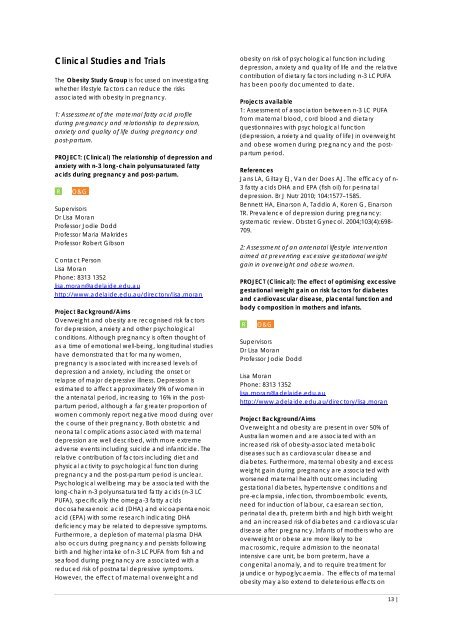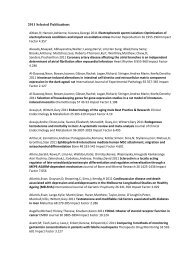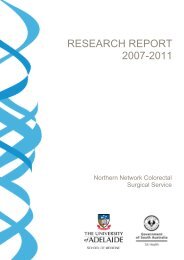Honours Project Book - Faculty of Health Sciences - University of ...
Honours Project Book - Faculty of Health Sciences - University of ...
Honours Project Book - Faculty of Health Sciences - University of ...
Create successful ePaper yourself
Turn your PDF publications into a flip-book with our unique Google optimized e-Paper software.
Clinical Studies and Trials<br />
The Obesity Study Group is focussed on investigating<br />
whether lifestyle factors can reduce the risks<br />
associated with obesity in pregnancy.<br />
1: Assessment <strong>of</strong> the maternal fatty acid pr<strong>of</strong>ile<br />
during pregnancy and relationship to depression,<br />
anxiety and quality <strong>of</strong> life during pregnancy and<br />
post-partum.<br />
PROJECT: (Clinical) The relationship <strong>of</strong> depression and<br />
anxiety with n-3 long-chain polyunsaturated fatty<br />
acids during pregnancy and post-partum.<br />
R. O&G.<br />
Supervisors<br />
Dr Lisa Moran<br />
Pr<strong>of</strong>essor Jodie Dodd<br />
Pr<strong>of</strong>essor Maria Makrides<br />
Pr<strong>of</strong>essor Robert Gibson<br />
Contact Person<br />
Lisa Moran<br />
Phone: 8313 1352<br />
lisa.moran@adelaide.edu.au<br />
http://www.adelaide.edu.au/directory/lisa.moran<br />
<strong>Project</strong> Background/Aims<br />
Overweight and obesity are recognised risk factors<br />
for depression, anxiety and other psychological<br />
conditions. Although pregnancy is <strong>of</strong>ten thought <strong>of</strong><br />
as a time <strong>of</strong> emotional well-being, longitudinal studies<br />
have demonstrated that for many women,<br />
pregnancy is associated with increased levels <strong>of</strong><br />
depression and anxiety, including the onset or<br />
relapse <strong>of</strong> major depressive illness. Depression is<br />
estimated to affect approximately 9% <strong>of</strong> women in<br />
the antenatal period, increasing to 16% in the postpartum<br />
period, although a far greater proportion <strong>of</strong><br />
women commonly report negative mood during over<br />
the course <strong>of</strong> their pregnancy. Both obstetric and<br />
neonatal complications associated with maternal<br />
depression are well described, with more extreme<br />
adverse events including suicide and infanticide. The<br />
relative contribution <strong>of</strong> factors including diet and<br />
physical activity to psychological function during<br />
pregnancy and the post-partum period is unclear.<br />
Psychological wellbeing may be associated with the<br />
long-chain n-3 polyunsaturated fatty acids (n-3 LC<br />
PUFA), specifically the omega-3 fatty acids<br />
docosahexaenoic acid (DHA) and eicoapentaenoic<br />
acid (EPA) with some research indicating DHA<br />
deficiency may be related to depressive symptoms.<br />
Furthermore, a depletion <strong>of</strong> maternal plasma DHA<br />
also occurs during pregnancy and persists following<br />
birth and higher intake <strong>of</strong> n-3 LCPUFA from fish and<br />
seafood during pregnancy are associated with a<br />
reduced risk <strong>of</strong> postnatal depressive symptoms.<br />
However, the effect <strong>of</strong> maternal overweight and<br />
obesity on risk <strong>of</strong> psychological function including<br />
depression, anxiety and quality <strong>of</strong> life and the relative<br />
contribution <strong>of</strong> dietary factors including n-3 LCPUFA<br />
has been poorly documented to date.<br />
<strong>Project</strong>s available<br />
1: Assessment <strong>of</strong> association between n-3 LC PUFA<br />
from maternal blood, cord blood and dietary<br />
questionnaires with psychological function<br />
(depression, anxiety and quality <strong>of</strong> life) in overweight<br />
and obese women during pregnancy and the postpartum<br />
period.<br />
References<br />
Jans LA, Giltay EJ, Van der Does AJ. The efficacy <strong>of</strong> n-<br />
3 fatty acids DHA and EPA (fish oil) for perinatal<br />
depression. Br J Nutr 2010; 104:1577–1585.<br />
Bennett HA, Einarson A, Taddio A, Koren G, Einarson<br />
TR. Prevalence <strong>of</strong> depression during pregnancy:<br />
systematic review. Obstet Gynecol. 2004;103(4):698-<br />
709.<br />
2: Assessment <strong>of</strong> an antenatal lifestyle intervention<br />
aimed at preventing excessive gestational weight<br />
gain in overweight and obese women.<br />
PROJECT (Clinical): The effect <strong>of</strong> optimising excessive<br />
gestational weight gain on risk factors for diabetes<br />
and cardiovascular disease, placental function and<br />
body composition in mothers and infants.<br />
R. O&G.<br />
Supervisors<br />
Dr Lisa Moran<br />
Pr<strong>of</strong>essor Jodie Dodd<br />
Lisa Moran<br />
Phone: 8313 1352<br />
lisa.moran@adelaide.edu.au<br />
http://www.adelaide.edu.au/directory/lisa.moran<br />
<strong>Project</strong> Background/Aims<br />
Overweight and obesity are present in over 50% <strong>of</strong><br />
Australian women and are associated with an<br />
increased risk <strong>of</strong> obesity-associated metabolic<br />
diseases such as cardiovascular disease and<br />
diabetes. Furthermore, maternal obesity and excess<br />
weight gain during pregnancy are associated with<br />
worsened maternal health outcomes including<br />
gestational diabetes, hypertensive conditions and<br />
pre-eclampsia, infection, thromboembolic events,<br />
need for induction <strong>of</strong> labour, caesarean section,<br />
perinatal death, preterm birth and high birth weight<br />
and an increased risk <strong>of</strong> diabetes and cardiovascular<br />
disease after pregnancy. Infants <strong>of</strong> mothers who are<br />
overweight or obese are more likely to be<br />
macrosomic, require admission to the neonatal<br />
intensive care unit, be born preterm, have a<br />
congenital anomaly, and to require treatment for<br />
jaundice or hypoglycaemia. The effects <strong>of</strong> maternal<br />
obesity may also extend to deleterious effects on<br />
13 |





